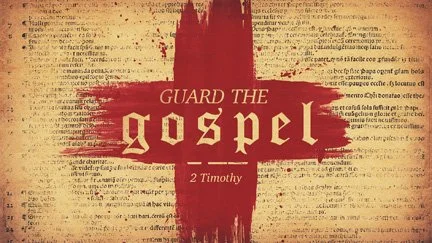Exodus 20:16
I want you to imagine for a moment that you have been arrested for a crime that you didn’t commit. The police came to your door, put you in handcuffs, and took you to the police station. You were fingerprinted and your picture was taken, you were put in orange overalls and locked in a cell. You were appointed a defense attorney who never seemed to have much time to talk to you because he was carrying such a heavy load of cases. You know you are innocent, but everyone else seems to assume you are guilty. That is what happened to Darryl Burton on June 28, 1984, when he was arrested for murder.
Eyewitnesses to the crime said that the killer was short, about 5’6’’ tall, and a light-skinned black man. Darryl is 5’10’’ tall and dark-skinned. There was no motive, no weapon, no fingerprints, no DNA, no confession, and no evidence of any kind, except for two false witnesses who agreed to testify against Darryl in exchange for having serious criminal charges against them dropped. When an actual eyewitness to the crime attended the trial, she realized that they had the wrong man and she told the police. But because Darryl’s lawyer had not interviewed her in preparation for the trial, she was not permitted to testify. Darryl was found guilty of murder and was sentenced to 50 years plus 25 years, to be served consecutively. It would be 75 years until he could be considered for parole. It took 24 years, but Darryl was finally exonerated on August 29, 2008.
It is estimated that somewhere between 1 and 4% of those people currently in prison in the United States were falsely accused and wrongly convicted. That may seem like a small percentage; after all, that means that at least 96% of the time the prosecutors had the guilty party. But we have about 2.3 million people in prison, which means that between 23,00 and 92,000 of them are innocent people who are behind bars for crimes they did not commit based on false testimony. Adam Hamilton points out in his book, Words of Life, that a criminal justice system only works if people tell the truth, and that it is clear that bearing false witness can have devastating results. As J. Ellsworth Kalas states in The Ten Commandments from the Back Side, truth in a court of law is a matter of life and death.
But courts of law are not the only places where people bear false witness. The ninth commandment is also broken in the political arena. And not only by politicians, but by people just like us. Adam Hamilton writes: We live in a time when it is increasingly difficult to tell what is true. In our nation and local communities, our traditional sources for investigating, discerning, and reporting the truth are caught in the political polarization that is dividing our country. Regardless of how fair and unbiased a media outlet attempts to be, if its reports are critical of a politician or political party, they will be blasted by supporters of that party or politician as “fake news.” We tend to choose news sources that align with or confirm our biases, which serves only to deepen our polarization.
This polarization sometimes manifests itself in people of faith participating in bearing false witness in the area of politics. Because we’ve not taken the time to listen to or understand the political “other,” we often represent them in ways that do not, in fact, reflect their views. Rather than digging in to understand another’s views …, it is easier to oversimplify and misrepresent their views.
One reason that this kind of thing can take place so easily is because of social media. It is so easy for false information to be spread. In the 2016 presidential election season, the Pew Center reported that 23 percent of Americans either knowingly or unknowingly shared a made-up news story on social media. That means that nearly 1 in 4 of us were posting stories that were not true; we didn’t take time to verify that they were factual before we shared them with other people. This is breaking the ninth commandment and is really not acceptable behavior.
Another area in which we are guilty of bearing false witness is gossip. Why is it that we enjoy gossip so much? Adam Hamilton states, “We seem hardwired to share gossip. There is something within us that enjoys knowing the ‘latest dirt’ or sharing the ‘inside story’ on someone else. At this office, this used to take place around the water cooler. It was the stuff that was shared at the barbershop or beauty salon. An amazing amount of gossip happens in church groups, where it is sometimes shared as a ‘prayer concern.’ Gossip makes us feel empowered, often because it makes us feel morally superior as we point out the perceived failures or foibles of others or pass along what someone else has shared with us in confidence. In the process, we bring harm to people and damage their reputations.”
I had a woman in my church in Pepperell, Massachusetts, named Ethel. She was an absolute snake. She lived on her telephone, spreading gossip and innuendo like it was going out of style. If she was home, you couldn’t get her on the phone, because she was on it. She was so mean, that if people saw her coming down the street, they would turn and go in the opposite direction to avoid having to talk to her. And I have it on good authority that her gossip was responsible for breaking up a marriage. And yet, she considered herself a good Christian woman and sat in church every Sunday without a clue that she was doing anything wrong.
And men can be just as bad about gossip. I love watching reruns of “The Andy Griffith Show.” In one episode, Andy and Barney are teasing Aunt Bee and some of her friends about being gossips. So the women plot to show the men that they are just as involved in gossiping as the women. A stranger has come to town who is a shoe salesman. But the women start a rumor that he is really a talent agent looking for new performers. So pretty soon the men are all lined up outside his door at the hotel with their children or other relatives wanting to audition for him. The salesman ends up selling more shoes than he has ever sold before! And the women get the last laugh on the men.
But gossip can have devastating effects. It can ruin reputations and break up marriages. And social media makes this so much easier to do, too. People can put as many lies and half-truths out there as they want to, stating them as if they were facts, and once something is out there it can’t be taken back. And the damage can be more than just to a reputation; it can cost a life. Young adults have taken their own lives in response to lies that have been posted about them on social media.
But the people doing the gossiping are only part of the problem. Those who listen to it are just as guilty. J. Ellsworth Kalas writes, “If we sit in silence while a reputation is being discredited, when we know the truth or have good reason to question what is being said, we become party to slander and to the destruction of that person. Silence is not always golden; sometimes it is criminal.” So while we may get a thrill from being “in the know,” it is breaking the ninth commandment to participate in gossip by listening.
Another issue related to bearing false witness is hypocrisy: when a person’s actions do not match their words, or when a person’s behavior does not match what they say they believe in. In their book, UnChristian, David Kinnaman and Gabe Lyons write about perceptions that young people outside the church have about the church. About 85% of people ages 16 to 29 perceive the church to be hypocritical. They see Christians as people who say one thing and do another, or who don’t follow their own advice. Some of Jesus’s harshest words were for the Pharisees and teachers of the law whom he accused of being hypocrites. He knew that hypocrites were the worst kind of witnesses to the truth of the faith. Why would someone be attracted to Judaism or to Christianity if they don’t see followers practicing what they preach? It’s as if the teachings of our faith don’t really matter to us. And when we say one thing and do something else, it’s a kind of falsehood, a kind of lying, perhaps even to ourselves.
I want to reflect for a moment on the fact that we follow a man who was arrested and put to death for a crime he did not commit, based on the testimony of false witnesses. Jesus was brought before the Sanhedrin – the Jewish Council – who were hoping to find false witnesses willing to testify against Jesus. Matthew 26:59-61 reads, “The chief priests and the whole council were looking for false testimony against Jesus so that they could put him to death. They didn’t find anything they could use from the many false witnesses who were willing to come forward. But finally they found two who said, ‘This man said, “I can destroy God’s temple and rebuild it in three days.”’” Of course, Jesus really did say that, but they misrepresented what he meant by it. And the Council had the two witnesses that they needed in order to satisfy the legal requirement to condemn Jesus to death. Which is exactly what they did. And Jesus was executed – with the help of the Roman governor – for a crime he did not commit, based on false testimony. Breaking the ninth commandment can have deadly consequences.
I’d like to end by telling you the rest of the story of Darryl Burton. While Darryl was still in prison, he promised God that if God got him out of prison then he would serve God for the rest of his life. And he found it within himself to forgive those who were responsible for him being there: the false witnesses, the prosecutors, and the ineffective defense attorney. And when Darryl got out of prison, he attended seminary and when he graduated, he was hired as a member of the staff of Church of the Resurrection, as a pastor of congregational care, the church where Adam Hamilton is senior pastor. He is helping to lead one of the largest United Methodist churches in the United States.

























